Design and Assessment of a 5G Base Station Using Massive MIMO for Fixed Wireless Access
 Fixed Wireless Access is a key application expected to benefit from 5G networks. This webinar demonstrates how modeling and simulation can be used to assist system designers, first in the design of a complex antenna array for a base station, and then to assess its potential performance in the field.
Fixed Wireless Access is a key application expected to benefit from 5G networks. This webinar demonstrates how modeling and simulation can be used to assist system designers, first in the design of a complex antenna array for a base station, and then to assess its potential performance in the field.
This webinar was hosted by IEEE's Engineering360.
Download the presentation slides...
Overview
Fixed wireless access (FWA) is one of the key applications expected to benefit from 5G networks. New spectrum at millimeter wave frequencies and new technologies such as MIMO beamforming offer both opportunities and challenges for design and deployment.
This webinar demonstrates how modeling and simulation can be used to assist system designers, first in the design of a complex antenna array for a base station, and then to assess its potential performance in the field. The session begins with an overview of simulations using Remcom's XFdtd® to design a massive MIMO array and simulate effective antenna patterns and efficiency for elements of the array. This includes the prediction of sample beam patterns using beamforming weighting coefficients to estimate peak gain along with other performance metrics over a range of angles.
Next, Wireless InSite® is used to place the base station within a simulated suburban FWA scenario to evaluate its performance in terms of the signal-to-noise and throughput that can be delivered to houses on a neighborhood street, including the impacts of multipath, shadowing, and attenuation from vegetation and building walls. This analysis includes the evaluation of potential options for consumer premises equipment (CPE), including exterior roof-mounted or window-mounted fixtures, as well as potential indoor systems. The purpose of this analysis is to estimate how different configurations could affect performance of the system, primarily evaluated in terms of the peak potential downlink throughput.
The overall objective is to demonstrate a simulation-based methodology for designing systems and antennas and evaluating these designs when placed within realistic environments for their intended application.
